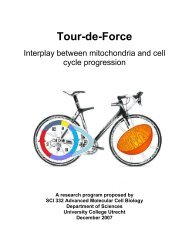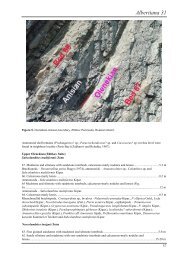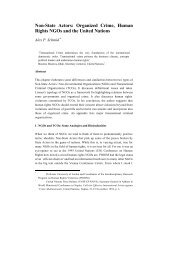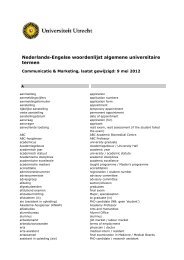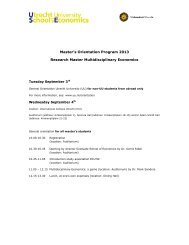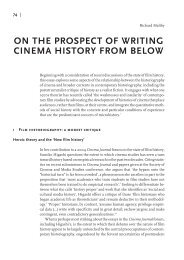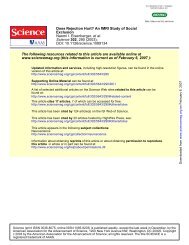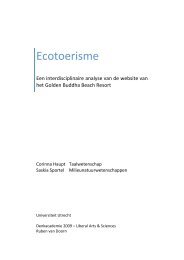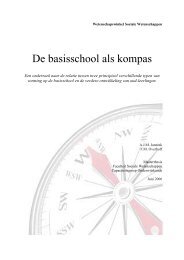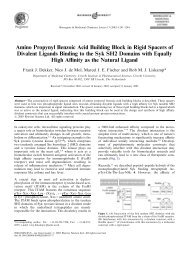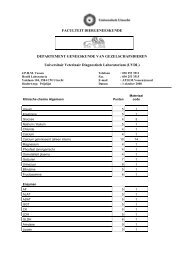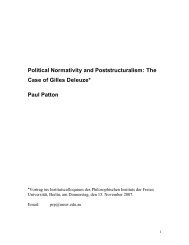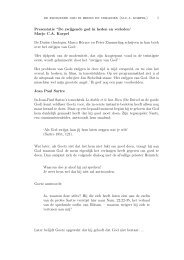Review of the Research Institute for History and - Universiteit Utrecht
Review of the Research Institute for History and - Universiteit Utrecht
Review of the Research Institute for History and - Universiteit Utrecht
You also want an ePaper? Increase the reach of your titles
YUMPU automatically turns print PDFs into web optimized ePapers that Google loves.
8. International <strong>and</strong> Political <strong>History</strong> (pr<strong>of</strong>. H. Righart 1994-2001, pr<strong>of</strong>. Duco Hellema 2001-)<br />
9. Social <strong>and</strong> Economic <strong>History</strong> (pr<strong>of</strong>. Jan Luiten van Z<strong>and</strong>en, 1994-)<br />
10. Gender Studies (pr<strong>of</strong>. Rosi Braidotti 1994-)<br />
The division <strong>of</strong> OGC research programmes matches that <strong>of</strong> <strong>the</strong> national research schools, in which <strong>the</strong><br />
majority <strong>of</strong> OGC-faculty participate. This structure has been chosen to optimize collaboration between<br />
<strong>the</strong> local institute <strong>and</strong> national research organizations, <strong>and</strong> thus to pr<strong>of</strong>i t from <strong>the</strong> momentum <strong>and</strong> scope <strong>of</strong><br />
<strong>the</strong>se national research schools. These provide graduate courses <strong>for</strong> PhDs. Local programme leaders are <strong>the</strong><br />
interface between local <strong>and</strong> national organization. They are almost to a man/woman involved in board or<br />
management <strong>of</strong> <strong>the</strong> national research schools. It is <strong>the</strong>ir task to ensure that members <strong>of</strong> <strong>the</strong> research groups<br />
participate in <strong>the</strong> various programmes <strong>of</strong> <strong>the</strong> national research schools, <strong>and</strong> to organize local activities,<br />
ranging from seminars <strong>and</strong> lectures to full-scale conferences, by <strong>and</strong> <strong>for</strong> <strong>the</strong> members <strong>of</strong> <strong>the</strong>ir group. On <strong>the</strong><br />
level <strong>of</strong> <strong>the</strong> programmes international cooperation takes place in different modalities. On <strong>the</strong> level <strong>of</strong> <strong>the</strong><br />
institute, <strong>the</strong> OGC has an exchange agreement with UCLA, <strong>and</strong> is a member <strong>of</strong> <strong>the</strong> Consortium <strong>of</strong><br />
Humanities Centres <strong>and</strong> <strong>Institute</strong>s (CHCI).<br />
B 4. <strong>Research</strong>ers <strong>and</strong> o<strong>the</strong>r personnel<br />
OGC faculty includes <strong>the</strong> following categories <strong>of</strong> researchers:<br />
(a) permanent academic staff (<strong>of</strong>fi cially working in one <strong>of</strong> <strong>the</strong> teaching institutes <strong>and</strong> seconded to OGC <strong>for</strong><br />
<strong>the</strong>ir research time, a few fte is directly affi liated with OGC)<br />
(b) post-doctoral researchers (directly affi liated with OGC)<br />
(c) PhD students (directly affi liated with OGC).<br />
Permanent (academic) staff<br />
The Dutch system has three ranks <strong>for</strong> <strong>the</strong> permanent faculty members:<br />
(i) Full pr<strong>of</strong>essor;<br />
(ii) Associate pr<strong>of</strong>essor (UHD in Dutch);<br />
(iii) Assistant pr<strong>of</strong>essor (UD in Dutch).<br />
For <strong>the</strong> senior ranks <strong>the</strong> faculty <strong>of</strong> Arts has a more or less fi xed number <strong>of</strong> positions. There is no promotion<br />
system. In order to move up in rank one has to apply if <strong>the</strong>re is a vacancy. Assistant pr<strong>of</strong>essors are evaluated <strong>for</strong><br />
tenure after two years. If <strong>the</strong> evaluation is positive <strong>the</strong>y get tenure, but <strong>the</strong>y stay in <strong>the</strong>ir rank.<br />
In addition to regular full pr<strong>of</strong>essors <strong>the</strong>re are also special chairs, mostly <strong>for</strong> 1 day a week. Holders <strong>of</strong> such<br />
a special chair are usually appointed by a foundation under approval <strong>of</strong> <strong>the</strong> Faculty <strong>and</strong> <strong>the</strong> Board <strong>of</strong> <strong>the</strong> university.<br />
Only full pr<strong>of</strong>essors <strong>and</strong> special chair pr<strong>of</strong>essors have <strong>the</strong> right to act as promoter(e)s (in <strong>the</strong> Ne<strong>the</strong>rl<strong>and</strong>s<br />
<strong>the</strong> full right to supervise dissertations, called ius promovendi). Associate <strong>and</strong> assistant pr<strong>of</strong>essors can act as daily<br />
supervisors (so-called co-promotor).<br />
In <strong>the</strong> Faculty <strong>of</strong> Arts research time is allotted by a st<strong>and</strong>ard rule: full pr<strong>of</strong>essors <strong>and</strong> associate pr<strong>of</strong>essors<br />
have 40% research time, assistant pr<strong>of</strong>essors have 30% research time. These percentages are indicative. That is,<br />
<strong>the</strong> actual amount <strong>of</strong> research time <strong>of</strong> individual researchers may in principle vary over <strong>the</strong> years. In practice,<br />
it turns out that <strong>the</strong> amount <strong>of</strong> research time actually available is lower than <strong>the</strong> amount indicated, because <strong>of</strong><br />
teaching pressures. The <strong>Utrecht</strong> Faculty <strong>of</strong> Arts <strong>and</strong> <strong>the</strong> Humanities does not have a system <strong>of</strong> sabbaticals.<br />
The members <strong>of</strong> <strong>the</strong> academic staff with research time are appointed by <strong>the</strong> teaching institutes, <strong>and</strong><br />
subsequently included in one <strong>of</strong> <strong>the</strong> research institutes. It has been <strong>the</strong> explicit policy <strong>of</strong> <strong>the</strong> Faculty Board to<br />
include as many faculty as possible in ei<strong>the</strong>r <strong>of</strong> <strong>the</strong> research institutes.<br />
As table B.1 shows, <strong>the</strong> average age <strong>of</strong> OGC faculty has increased, especially in <strong>the</strong> categories <strong>of</strong> full <strong>and</strong><br />
associate pr<strong>of</strong>essors. In <strong>the</strong> next evaluation period (2005-2010) many <strong>of</strong> <strong>the</strong>m will retire <strong>and</strong> be replaced with<br />
young scholars.<br />
363 <strong>Research</strong> <strong>Institute</strong> <strong>for</strong> <strong>History</strong> <strong>and</strong> Culture OGC<br />
11



